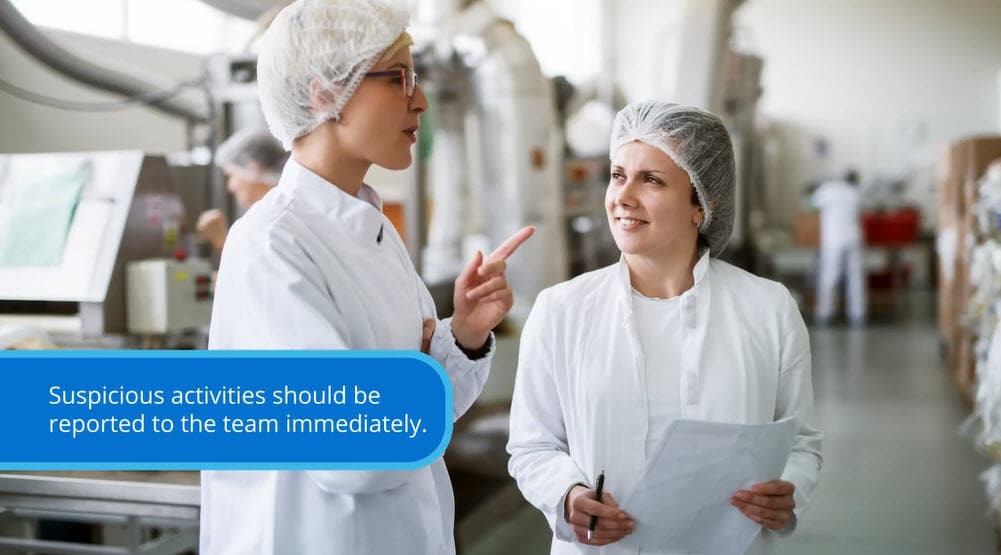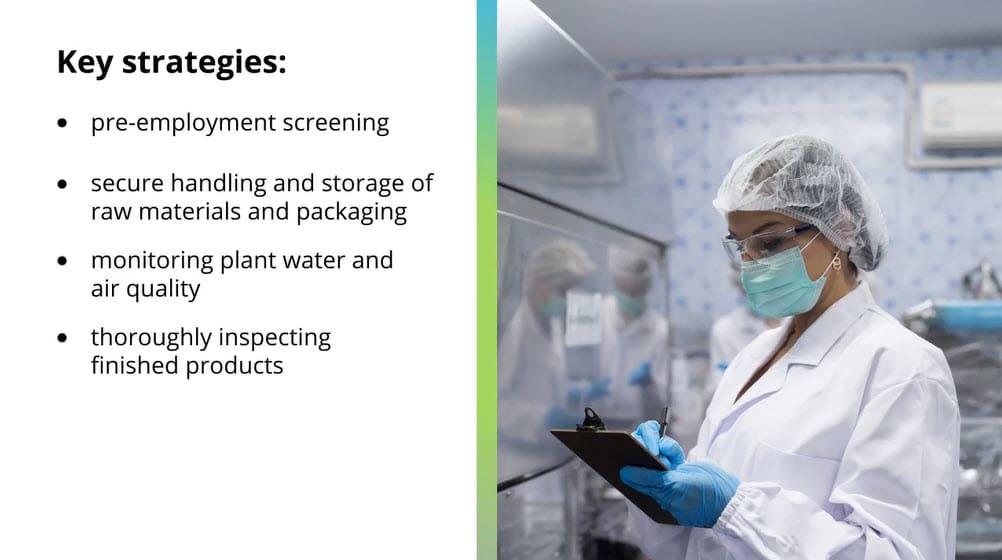Food Safety Facility Defense Basics
This food defense course is part of the Online Food Safety Training Course Library.
Food defense training is essential to protecting our food supply from malicious acts. This online course answers the question, “What is a food defense plan,” and introduces employees to security measures and facility defense best practices. Employees will learn to identify and respond to potential threats by implementing effective mitigation strategies to protect food against intentional adulteration, tampering, and other intentional attacks, ensuring the safety and integrity of food products.
Use this food defense course to help your workforce meet the training requirements necessary to develop plans and increase awareness of emerging risks to the food supply.









Demos + Pricing
Learn more about our courses, get pricing, and see our platform.
Course Details
Learning Objectives
By the end of this food defense course, you will be able to:
- Define food defense and describe the key components of an effective food defense plan
- Identify potential food safety threats and vulnerabilities in food manufacturing and distribution
- Explain the role of employees in preventing and detecting food security incidents
- Discuss how to develop and implement actionable process step to secure facility perimeters, control access, and monitor activities, including procedures for screening employees, visitors, and incoming materials
- Identify signs of potential food tampering or intentional contamination
- Discuss how to communicate an emergency response effectively during crisis management and conduct a Food Defense Vulnerability Assessment
Specs
Frequently Asked Questions
What is Food Defense Training?
Food defense training prepares teams to respond accordingly to intentional attacks on the food supply, like tampering, sabotage, and contamination. This isn’t about accidents. Someone wants to cause harm, and you need to spot it and stop it.
This course from Vector Solutions is designed to help stop incidents in your workplace before they happen, through better awareness, tighter security, and faster response. The training covers identifying weak spots in your security, controlling access to critical areas, and building response plans your team can actually execute when something’s wrong. You’ll also learn legal requirements, current industry standards, and explore real-world case studies.
Who should take this Food Defense Awareness course?
This course is suitable for food industry professionals, including quality assurance teams, plant managers, food safety officers, and employees responsible for food security and compliance.
How does this course help with Food Defense compliance?
The course follows industry regulations and best practices for food defense. It assists organizations in implementing security measures, conducting vulnerability assessments, and meeting food safety standards.
What are the key takeaways from this Food Defense Awareness training?
Participants will learn how to identify and reduce threats, improve facility security, and create food defense plans to protect the supply chain.
Can a lack of proper Food Defense training for employees impact a business?
Not having proper food safety facility defense training can put a business at risk for intentional contamination. The consequences may include:
- Public health issues, including potential outbreaks
- Costly recalls, which can run into millions of dollars
- Legal penalties, including fines and potential lawsuits
- Damage to reputation, leading to loss of customer trust
In fact, the average cost of a food recall can exceed $10 million, not including the long-term reputational damage and lost business.
Are food defense training courses mandatory?
In the U.S., the Food Safety Modernization Act (FSMA) requires some food facilities to have food defense plans that likely include training to prevent intentional adulteration. However, this may not apply to all facilities, and regulations differ globally (FDA Food Defense).
Some U.S. regulations that may require food defense training include:
- FDA Food Code: Recommends food defense training for food establishments to prevent intentional contamination.
- Bioterrorism Act of 2002: Requires food facilities to provide training to safeguard against potential acts of terrorism and contamination.
- HACCP (Hazard Analysis and Critical Control Points): Includes training as part of its system to identify and mitigate risks, including those from intentional adulteration.
What are the main components of Food Fraud Prevention?
Food fraud involves the intentional misrepresentation or adulteration of food products for financial gain. This can include activities like mislabeling, substitution of ingredients, or tampering with the authenticity of food. Preventing food fraud is critical to ensure consumer safety and maintain trust in the food industry. Effective prevention involves several key steps:
- Vulnerability Assessment: Identifying weak points in the supply chain.
- Supplier Management: Ensuring trusted, audited suppliers.
- Monitoring: Keeping track of fraud alerts and market trends.
- Testing: Verifying product authenticity.
- Training: Educating staff on fraud risks (IFST Food Fraud).
How does food tampering and contamination impact public health?
Food tampering, which involves adding harmful substances or misrepresenting food products, can lead to serious health issues. It can cause foodborne illnesses, poisoning, and even fatalities. Beyond the immediate health risks, food tampering can result in costly recalls and long-term damage to public trust. Historical cases from U.S. food production show the significant impact tampering can have on public health:
- 2008 Peanut Butter Salmonella Outbreak: A Salmonella outbreak linked to contaminated peanut butter resulted in over 700 illnesses and several deaths.
- 2009 National Peanut Corporation of America Salmonella Contamination: Contaminated peanut products from this facility were responsible for over 700 illnesses across the U.S., leading to a major recall.
- 2015 Blue Bell Ice Cream Listeria Contamination: Listeria contamination in Blue Bell ice cream caused three deaths and several illnesses, prompting a large recall of the product.
How does offering Food Defense online training help streamline program management?
Online food defense training offers several advantages that help streamline program management:
- Flexible and Scalable: Employees can learn at their own pace, which allows for easier scheduling and accommodates businesses of all sizes.
- Up-to-Date Content: Online training ensures all employees receive the same accurate, current information, helping maintain compliance with regulations.
- Cost Savings: Online courses eliminate the need for travel, in-person trainers, and printed materials, reducing overall training costs.
Sample Video Transcript
Imagine a world where the food we consume is no longer safe. A world where malicious actors can tamper with our food supply, causing widespread illness and panic. This is the reality we face if we do not prioritize food defense.
Food defense is critical to protecting the food supply chain from intentional contamination, tampering, or malicious acts. It involves implementing strategies and measures to prevent, detect, and respond to any potential threats to the safety and integrity of food products.
In today’s global food supply chain, food products can be vulnerable to various risks, such as terrorist attacks, sabotage, or economically motivated adulteration.
These threats can have severe consequences, including foodborne illnesses, public health emergencies, and economic losses.
As food industry professionals, we ensure that the food we produce, process, and distribute is safe and free from deliberate harm. We must work together to implement robust food defense plans, foster a strong food safety culture, and remain vigilant against potential threats.
Throughout this course, we will explore the key components of an effective food defense
program. We will learn how to identify potential vulnerabilities, implement security measures, and respond to food defense incidents.
By the end of this course, you will be able to:
- Define food defense and describe the key components of an effective food defense plan
- Identify potential threats and vulnerabilities in food manufacturing and distribution
- Explain the role of employees in preventing and detecting food defense incidents
- Discuss how to develop and implement strategies to secure facility perimeters, control access, and monitor activities, including procedures for screening employees, visitors, and incoming materials
- Identify signs of potential food tampering or intentional contamination [and]
- Discuss how to communicate effectively during crisis management and conduct a Food Defense Vulnerability Assessment
Please be advised that this course contains images of animal products (such as raw and
cooked meat) for educational purposes.
Additional Resources
- FDA Food Defense Definition and Initiatives
- FSMA Final Rule on Mitigation Strategies for Food Defense
- FDA Food Defense Training and Educational Resources
- FSNS Guide on Creating a Food Defense Plan
- FoodDocs Overview of Food Defense and Planning
- Penn State Extension Developing a Food Defense Plan
- Christianson PLLP FSMA Penalties and Enforcement
- Manex Consulting Cost of FSMA Non-Compliance
- IBM Insights on FDA FSMA Value and Compliance
- Institute of Food Science and Technology Food Defense Statement
Explore Our Library of Food Safety Courses
-
- Full-length Food Safety Facility Defense course
- Foodborne Illness Prevention: Covers causes and prevention of foodborne illnesses through proper handling.
- Allergen Management: Teaches identification and control of allergens to prevent cross-contamination.
- Pest Control in Food Facilities: Provides strategies for maintaining a pest-free environment.
- HACCP Principles and Applications: Explains the Hazard Analysis and Critical Control Points system for hazard control.













